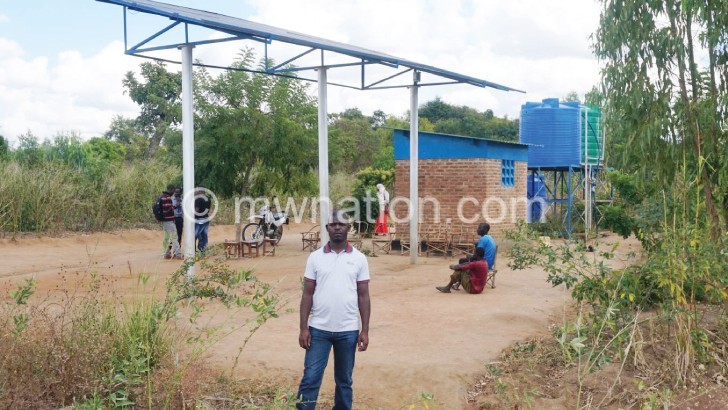Harnessing the enemy
As crops dry, farmers in Malawi turn to solar irrigation. Reuters correspondent CHARLES MKOKA highlights how water pumping and storage systems help ensure crops survive increasingly harsh droughts
As climate change brings longer droughts, farmers in eastern Malawi’s already dry Lake Chilwa basin are seeing an ever-more-frequent disaster: maize wilting or drying completely, leaving families hungry.
“In the past many farmers relied on rain-fed agriculture to grow their food,” said Edwin Liwonde, a subsistence farmer in the flat area, which is also prone to floods.
But now, worsening dry spells “mean no hope for harvests,” he told the Thomson Reuters Foundation in an interview.

Faced with growing losses, however, farmers in Zomba District have come up with an innovative way to adapt: Solar-powered pumps used to pull up underground water, and newly constructed water storage dams that are also used to farm fish.
They have also begun growing drought-hardy sweet potatoes to supplement maize, the region’s increasingly at-risk staple.
The changes, chosen by community members, put in place by Malawi’s government, and backed with $4.5 million from the Global Environment Facility, aim to help 5 800 households become more resilient to climate pressures – and show what might be scaled up in other drought-hit areas.
In traditional authorities (T/As) Mwambo and Ngwerelo in Zomba, and villages in Ntcheu District, solar panels supported on steel poles provide the power to pump groundwater from new boreholes into reservoirs capable of storing at least 10 000 litres.
A share of the water then is piped from the tanks to hydrants constructed in nearby fields – with another share going into the villages for household use.
The water systems, put in place last year, are capable of irrigating about 20 hectares of land each, Liwonde said.
At Gunde, a village in Ntcheu District, the system provides irrigation water and safe drinking water to 700 people in the area, said Ntombi Kafere, a member of the Umodzi Irrigation Scheme.
Farmers there expect it will boost incomes, especially as it lies close to Tsangano road, which marks the boundary with Mozambique and which links the area to nearby markets.
“This scheme is strategically located [with] fruits and vegetables growing here,” said Richard Banda, local chairman of the irrigation project. “Our farm produce will have a ready market, considering the Tsangano road is being developed to bitumen.”
Farmers say the changes are the ones they will likely stick with even after Adapt-Plan, the five-year GEF-funded project, ends in September 2019.
“We are prepared to forge ahead with the initiative, even if this project phases out,” said Raphael Nkhoma, one of 30 farmers in the new Chiswamafupa Irrigation Scheme in Mbalame, a village in T/A Mwambo.
The Department of Irrigation says irrigation projects are on the rise in Malawi as a result of changing weather conditions.
In 2016-2017, more than 2 375 hectares of farmland in Malawi began being irrigated for the first time, with more than half of that land in the hands of small-scale farmers.
Altogether the country has about 112 000 hectares under irrigation, out of about 400 000 where the systems could be used, according to the Department of Irrigation.
Efforts to boost the amount of farmland being irrigated in Malawi face challenges, however, from lack of cash to insecure land tenure and shortages of electricity needed to power irrigation pumps, the result of drought hitting the country’s hydroelectric dams.
To shore up harvests, the country’s fast-vanishing forests also need to be better safeguarded to help protect rain patterns and rain-fed agriculture, said Marlene Chikuni, a natural resources management specialist at the University of Malawi.
Michael Makonombela, deputy director of the Environmental Affairs Department, said one key to the new climate adaptation efforts is letting farmers choose what changes work best for them rather than letting outsiders make those decisions.
“Farmers have a choice as to what is more practical in their local context, be it livestock husbandry, aquaculture or an integrated irrigation system,” he said.
“That makes the projects “relevant to the challenges caused by climate change”na





